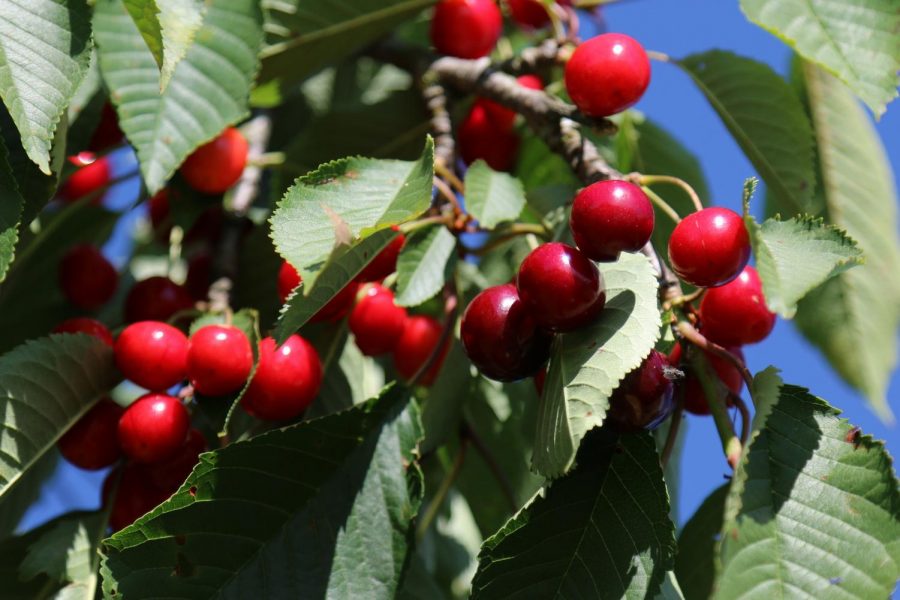Farm workers describe struggles during COVID-19
Employees required to work long hours with no days off, wear masks in hot weather
One employee at a cherry orchard said she works at least 12 hours a day from 5 a.m. to 5 or 6 p.m.
June 15, 2020
Every morning, Neida Regis is out of her house by 4:30 a.m., so she can make it to the orchard by 5. She makes sure to grab her face mask, knowing she will not be back until 5 or 6 p.m., the same as every day during cherry season.
For a month and half, she will have no weekends or time off, just hard work to make sure the harvest goes smoothly. By the time cherry season is over, she will be relieved to go back to her tree-trimming schedule, where she only works eight-hour days for six days a week.
Regis, junior pre-nursing major at WSU, is originally from Toppenish, Washington, where she returns every summer to work in the orchards with her mother and three sisters.
She and her family are some of the many seasonal farm employees who are working non-stop during the pandemic, just to make ends meet.
Michael Heim, director of WSU’s College Assistance Migrant Program, said he has watched many students struggle to balance their worry about COVID-19 with their families’ financial needs.
The migrant program is a federally-funded initiative that helps incoming students with farm-working backgrounds. Regis said she was a part of the program during her freshman year.
“Traditionally, our seasonal migrant farm-working families aren’t the typical demographic that can leave … from work to go seek healthcare and get treatment,” Heim said. “They live in that financially precarious position where missing a day or two or three … can be detrimental.”
Regis said she believes there might be more risk of getting sick at the orchard, because no one there can afford to take time off. She said it is a policy for an orchard to lay off employees if they have tested positive for COVID-19. However, sometimes, those who are laid off get a job at a different orchard, she said.
“People who work out in the orchards can’t afford to take that time off because no one’s going to be paying them and they have bills to pay and families to take care of,” she said. “So they’ll probably go to another orchard and ask for another job while they’re infected and that’ll infect so many more people.”
Orchard workers have been taking precautions to prevent the spread of COVID-19, but these precautions could cause other problems, Regis said. At the orchard she works at, all workers are required to wear masks, which could be problematic because of the summer heat.
“My mom told me to start wearing [a mask] already this past month just so I could practice and get the hang of having a mask on, because it is very difficult,” she said.
Regis said it is hard to wear a mask at room temperature, and even harder to wear one when it is 90 degrees outside.
Heim said he was also concerned about adding another layer to the already difficult jobs farm-workers have.
“They have to keep themselves safe from other threats as well,” he said.
He said farm-workers also have to worry about heatstroke, staying hydrated and working 12-hour shifts a day.
“It exacerbates all the effort it takes to harvest these crops by adding another factor, which is COVID-19,” he said.
Ricardo Escoto, junior human development major also involved with CAMP, lives in Manson, Washington, where his mother packs fruit from orchards. He said it was hard on his whole family when she had to work more because of the pandemic.
“My mom — her job consisted of working longer hours just because of what was happening, and she just became more of an essential worker, getting fruit packed up and sent to essential places,” he said.
His family did not see his mom often enough, he said. His mom’s schedule has slowly returned to normal, but there are still stressful parts of her work.
“It’s still a little scary, she does have to wear a face shield and a face mask,” he said. “She’s constantly getting her temperature taken at work … when she gets home she takes off her uniform and she leaves it outside.”
Regis said her work in the orchards makes her appreciate what her parents do for her and her sisters. She said she now values everything she has.
“I can’t believe how little they get paid,” she said. “I’ve never paid attention to how hard they work just to bring in the bare minimum for us.”
Heim said he is always impressed by the work done by CAMP students and their families.
“I think one of the most important things is to reinforce the idea that it’s people doing work,” Heim said. “There are hands that are cultivating our food, and without those hands in the field, the harvest [would not happen].”











